The Thai junta staged the coup in 22 May with the ambitious mission of ending political differences in the kingdom of more than 60 million people which has been deeply divided for almost a decade. It vowed to bring back reconciliation and return happiness to the Thai people. In doing so, it has prohibited people from joining any assembly or holding political seminars, it has detained activists, it has threatened outspoken academics, and it has shut down media affiliated to political camps. This is, they say, to stop people from having more differences in political thinking.
The first conflict that the junta has tackled seriously is in the North East of Thailand. This has nothing to do with the colour-coded political conflict and involves less than 10,000 people in six villages in Wang Saphung District of Loei who have been affected by mining operations on about 10,000 acres of land.
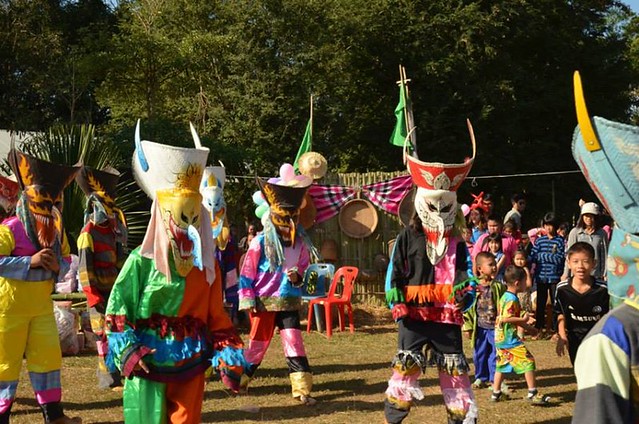
Loei Province is famous for its Phi Ta Khon Ghost Festival. In the photo, the community around the mine shows Phi Ta Khon on the Children’s Day in January 2014. Photo courtey of Loei Ore Mine’s Facebook
The junta’s intervention in the past two months has halted the mining which has degraded the environment and the livelihoods of the villagers. However, the short-cut of an alleged attempted backdoor deal with the mining company fell short of solving the conflict and instead has destroyed the credibility of the junta and villagers’ trust in them.
On Tuesday, the military invoked martial law to force the villagers to stop a planned activity to raise environmental concerns. The military also confiscated a stereo belonging to the villagers. This is not the first time that the military has pressured the villagers not to make any move concerning the mine and environmental issues, but insisted that the military will help solve the problem.
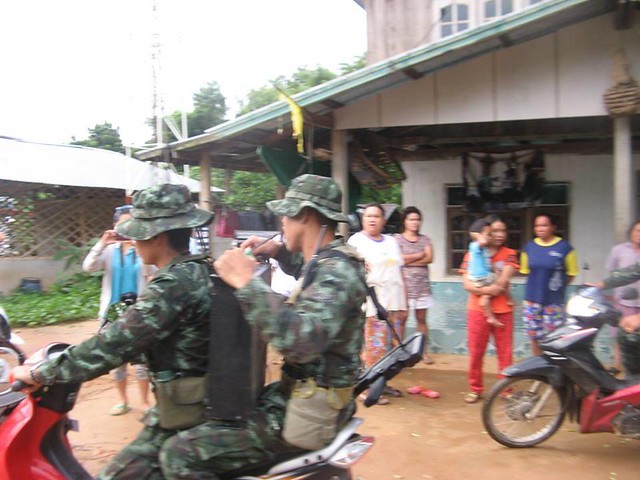
The military on 25 August forced the villagers to stop a planned activity to raise environmental concerns. The military also confiscated a stereo belonging to the villagers. Photo courtey of Loei Ore Mine’s Facebook
“We’ve been treated badly for so long but the military has even aggravated what’s bad. I’m speechless,” said Pornthip Hongchai, a village leader and an active member of Khon Rak Baan Koed (People Who Love Their Home). The KRBK, consisting of villagers from six villages affected by the gold mining operations of Tungkum, the mining operator in the area, was set up to defend local natural resources and prevent their exploitation by investors.
Throughout 12 years of mining, villagers have suffered numerous environmental problems. The most chronic is the contamination of water sources from cyanide waste on the mountain in Loei where the mine is situated. According to the group, about 3,700 villagers from 1,000 families have suffered from drinking the water. A former mine worker suffered cyanide poisoning and was paralyzed. The authorities have never taken action against the company.
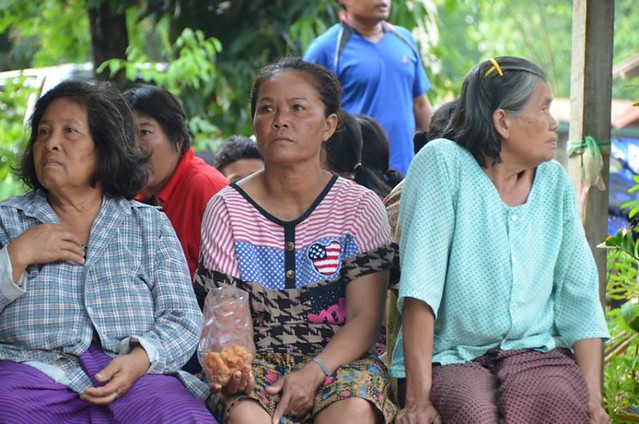
The villagers during a community meeting in June 2014. The meeting was held after gunmen came to villagers and threaten the villagers. Photo courtey of Loei Ore Mine’s Facebook
In November 2012, the mine was ordered to close for three months after a dam for collecting cyanide waste collapsed. However, the company later resumed operations as if nothing had happened.
The tension between villagers and Tungkum Co. Ltd., the mine operator, flared up in September 2013 when the villagers barricaded the mine entrance, blocking trucks, each of which normally carries 15 tons of cyanide waste, from passing through the villages. Although the sound of the machines disappeared and the sound of birds chirping returned, the villagers had to live in fear because of judicial harassment, thugs, gunmen and death threats.
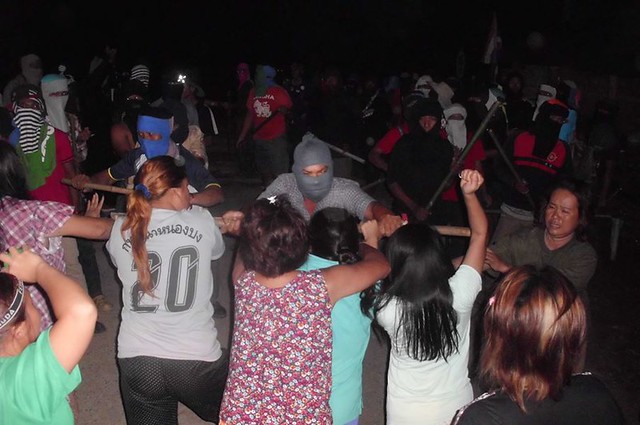
The villagers fight the thugs on the night of 15 May 2014 Only two men were charged and have been released on bail. Photo courtey of Loei Ore Mine’s Facebook
In May, gunmen reportedly shot into the air to threaten the villagers in June. And on 15 May, which the villagers call “15 Black May” villagers in Ban Na Nong Bong were beaten up by 300 armed men. The leader of the KRBK also received a death threat.
Moreover, Tungkum has filed seven civil and criminal lawsuits against 33 villagers and demanded compensation of 270 million baht. The villagers have donated title deeds as security to bail out those who were charged, mostly poor farmers.
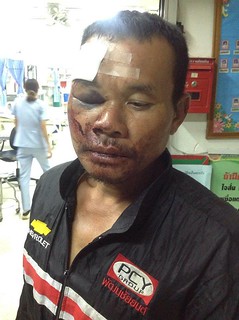
The villager who was beaten by the thugs on the night of 15 May 2014 Photo courtey of Loei Ore Mine’s Facebook
The company proposed to the villagers that they will withdraw the lawsuits and offer to share 20 per cent of the mining profits in exchange for the barricade to be lifted off. Nonetheless, the villagers have declined the offer and responded with a lawsuit in the Administrative Court against the company and the state authorities involved, including the then Minister of Industry.
After the coup on 22 May when martial law was imposed across the country, the junta has intervened in the conflict under its policy to build “reconciliation”. It has stopped the villagers from holding all kinds of activities, including a community concert, and said it would “protect” and “return happiness” to them.
To return happiness, the junta set up committees, with no one from the villages, but composed of representatives from several state agencies which the villagers say have never cared about their problems.
The committees organized negotiations between the villagers, led by the Khon Rak Baan Koed group, and the mining operator, and witnessed by provincial officials.
There is no surprise that he state authorities have always support the mine since apart from paying royalty to the Thai state, the company allocates its10 per cent of the company’s profit to the Thai state. The state has received about 350 million baht from the company.
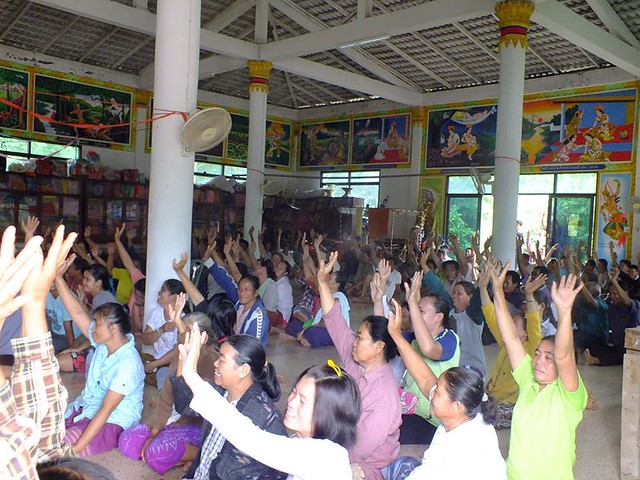
Vilaggers from six villages around the mine express their opinion regarding the mine during the referendum, held by Khon Rak Baan Koed on 18 July 2014. Photo courtey of Loei Ore Mine’s Facebook
The villagers demanded that the mine be closed and that the mine operator must compensate them and come up with remedial measures for the villagers. These demands come from a referendum held by villagers in the six villages in May and July.
However, on Monday, the military and the provincial authorities reportedly planned to have the village headmen sign an agreement with the mine operator. The KRBK said they did not have any knowledge of and did not approve this agreement. The agreement will reportedly grant concessions to Tungkum for two more plots of lands of about 3,900 acres. The Monday plan failed after the KRBK pressured and threatened the village headmen with lawsuits.
Pornthip said the military’s claim of helping to solve the conflict seems to have worsened the situation. Under the junta, they feel very frustrated because they were silenced and the villagers have lost hope and trust in the junta.
“Why did the military come? They claim that they’re here to protect us but instead they use martial law to prohibit us from expressing ourselves and voicing our thoughts,” said Pornthip. “We’ve had the idea that we should draft a letter asking the military to leave the area. We prefer to fight with thugs and gunmen on our own rather than be under the military. We’re afraid of the gunmen, but that’s better than the military because the military prohibits us from doing anything.”
“We told them that our freedom of expression is guaranteed under the interim constitution. The military replied ‘No, we rule under martial law here’,” said the village activist.
